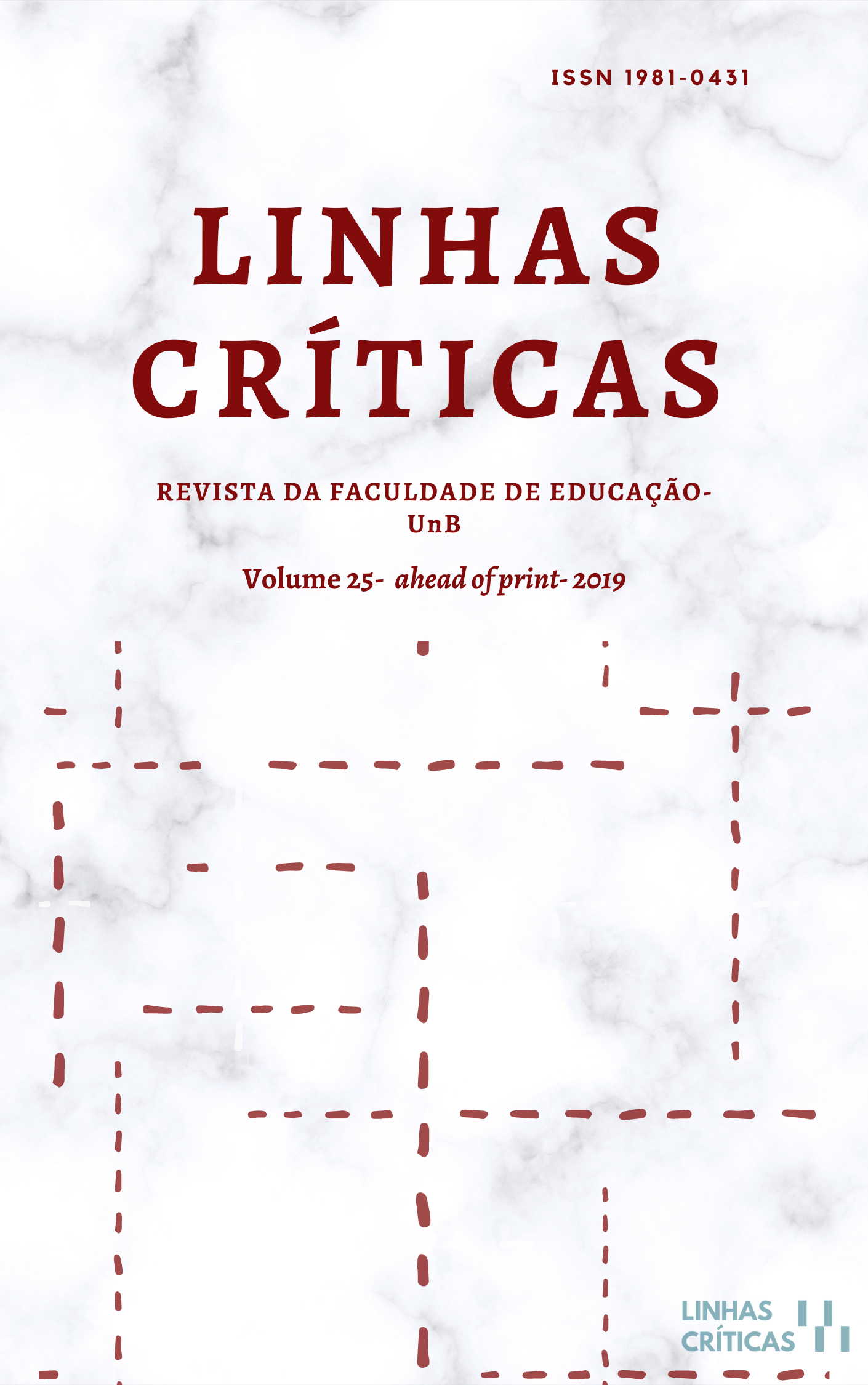Indicators of scientific literacy of teachers in service
biochemistry as a formative context
DOI:
https://doi.org/10.26512/lc.v25.2019.21587Keywords:
Scientific literacy, In service education, BiochemistryAbstract
In this article, the scientific education knowledge of a group of teachers of chemistry, biology and science was investigated, with special attention to the indicators of scientific literacy. From the offering of a continuing education extension course for this group of teachers, the research data were collected through the audiovisual recording of the classes and subsequent transcription of the same. These data were analyzed according to the indicators of scientific literacy, resulting in the manifestation of most of the expected indicators in each of the analyzed episodes, and the course offered helped in the process of scientific literacy of these professionals. Thus, the main contribution of this work was the identification and analysis of indicators of scientific literacy, in order to incorporate the theoretical framework of research in continuing teacher education.
Downloads
References
Aguilar, M.B.R., Oliveira, I.T., & Botero, W.G. (2016). As percepções de estudantes pré-vestibulandos sobre a disciplina de Química. Revista Thema, 13(3), 50-60.
Brasil. (2012). Resolução n. 466, de 12 de dezembro de 2012. Aprova diretrizes e normas regulamentadoras de pesquisas envolvendo seres humanos. Ministério da Saúde. Conselho Nacional de Saúde. Brasília, Diário Oficial da União, 12 dez. 2012.
Bybee, R.W. (1995). Achieving Scientific Literacy. The Science Teacher. 62(7), 28-33.
Cachapuz, A, Gil-Perez, D., Carvalho, A.M; P., Praia, J., & Vilches, A. (2011). A necessária renovação do ensino das ciências. São Paulo: Editora Cortez.
Cardoso, S. P., & Colinvaux, D. (2000). Explorando a motivação para estudar química. Química Nova, 23(3), 401-404.
Carvalho, A. M. P., & Gil-Pérez, D. (2001). A formação de professores de ciências. São Paulo: Editora Cortez,
Chassot, A. (2010). Alfabetização científica: questões e desafios para a educação. Ijuí: Ed.Unijui.
Del-Corso, T. M. (2014). Indicadores de alfabetização científica, Argumentos e Explicações: análise de relatórios no contexto de uma Sequência de Ensino Investigativo. (Dissertação de Mestrado em Ensino de Ciências). Programa de Pós-Graduação Interunidades, Faculdade de Educação, Universidade de São Paulo, São Paulo.
Del-Corso, T. M., Rezende, D. F. D., & Trivelato, S. L. F. (2014). Indicadores da alfabetização científica em uma SEI de biologia: a proposição das inscrições literárias como um novo indicador. Revista de Ensino de Biologia da Associação Brasileira de Ensino de Biologia (SBEnBio), 7, 7252-7263.
Driver, R., & Newton, P. (1997). Establishing the Norms of Scientific Argumentation in Classrooms, ESERA Conference, Roma.
Furlan, C. M., Almeida, A. C., Rodrigues, C. D. N., Tanigushi, D. G., Santos, D. Y. A. C., Motta, L. B., & Chow, F. (2011). Extração de DNA vegetal: o que estamos realmente ensinando em sala de aula? Química Nova na Escola, 33(1), 32-36.
Gil-Pérez, D., Furio, C., Valdes, P., Salinas, J., Martinez-Torregrosa, J., Guisasola, J., Gonzalez, E., Dumas-Carre, A., Goffard, M., & Carvalho, A. M. P. (1999). Tiene sentido seguir distinguiendo entre aprendizaje de conceptos, resolución de problemas de lápiz y papel y realización de prácticas de laboratorio? Enseñanza de las Ciencias, 17(2), 311-320.
Hazen, R. M., & Trefil, J. (1991). Science Matters. Achieving scientific literacy. New York: Anchor Books Doubleday.
Laugksch, R. C. (2000). Scientific Literacy: A conceptual overview. Science Education, 84(1), 71-94.
Lorenzetti, L., & Delizoicov, D. (2001). AC no contexto das séries inicias. Ensaio – Pesquisa em Educação em Ciências, 3(1), 1-17.
Maldaner, O. A. (2003). A formação inicial e continuada de professores de Química: professores/pesquisadores. Ijuí: Unijuí.
Marques, N. L. R., & Araujo, I. S. (2010). Investindo na formação de professores de ciências do ensino fundamental: uma experiência em física térmica. Experiências em Ensino de Ciências, 5(3), 131-152.
Márquez, C., Izquierdo, M., & Espinet, M. (2003). Comunicación multimodal en la clase de ciencias: El ciclo del agua, Enseñanza de las Ciencias, 21(3), 371-386.
Miller, J. D. (1998). The measurement of civic scientific literacy. Public Understanding of Science, 7, 203-223.
Negrete, A., & Lartigue C. (2004). Learning from education to communicate science as a good story, Endeavour, 28(3), 120-124.
Norris, S.P., & Philips, L.M. (2003). How Literacy in Its Fundamental Sense is Central to Scientific Literacy, Science Education, 87(2), 224-240.
Ramos, L. C., & Sá, L. P. (2013). A alfabetização científica na educação de jovens e adultos em atividades baseadas no programa mão na massa. Ensaio: Pesquisa em Educação em Ciências (Online), 15,123-140.
Sasseron, L. H. (2008). Alfabetização Científica no ensino Fundamental – Estrutura e Indicadores deste processo em sala de aula. (Tese de Doutorado em Educação). Programa de Pós-Graduação em Educação, Universidade de São Paulo, São Paulo.
Sasseron, L. H., & Carvalho, A. M. P. (2008). Almejando a alfabetização científica no Ensino Fundamental: a proposição e a procura de indicadores do processo. Investigações em Ensino de Ciências. 13(3), 333-352.
Sutton, C. (1997). Ideas sobre la ciencia e ideas sobre el lenguaje. Alambique. Didáctica de las Ciencias Experimentales. 12, 8-32.
Published
How to Cite
Issue
Section
License
Copyright (c) 2018 Revista Linhas Críticas

This work is licensed under a Creative Commons Attribution 4.0 International License.
Authors who publish in this journal agree to the following terms:
-Authors maintains the copyright and grants the journal the right of first publication, the work being simultaneously licensed under the Creative Commons Attribution License which allows the sharing of the work with recognition of the authorship of the work and initial publication in this journal.
- Authors are authorized to enter into additional contracts separately, for non-exclusive distribution of the version of the work published in this journal (eg publish in institutional repository or as a book chapter), with acknowledgment of authorship and initial publication in this journal.
-Authorers are allowed and encouraged to publish and distribute their work online (eg in institutional repositories or on their personal page) at any point before or during the editorial process, as this can generate productive changes as well as increase the impact and the citation of published work (See The Effect of Free Access).



